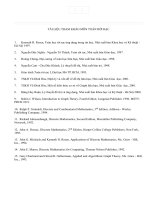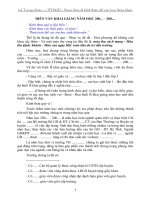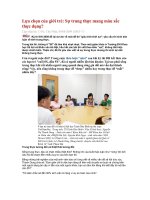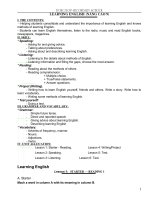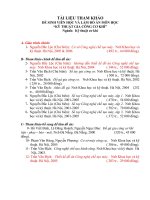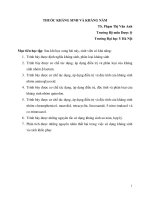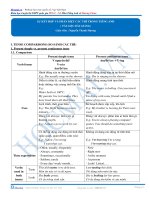TLTK
Bạn đang xem bản rút gọn của tài liệu. Xem và tải ngay bản đầy đủ của tài liệu tại đây (239.5 KB, 38 trang )
Dong Hop secondary school
Learning English (N©ng cao 9)
I. the contents:
- Helping students consolidate and understand the importance of learning English and knows
methods of learning English.
- Students can learn English themselves, listen to the radio, music and read English books,
newspapers, magazines.
II. Skill :
* Speaking:
- Asking for and giving advice.
- Talking about preferences.
- Asking about and describing learning English.
* Listening:
- Listening to the details about methods of English.
- Listening information and filling the gaps, choose the most answer.
* Reading:
- Reading about the methods of others
- Reading comprehension:
+ Multiple choice.
+ True/False statements.
+ Answer questions.
* Project (Writing).
- Writing how to learn English yourself, friends and others. Write a story. Write how to
learn vocabulary.
- Writing some methods of learning English.
* Test yourself:
- Doing a test.
III. Grammar and vocabulary:
* Grammar:
- Simple future tense.
- Direct and reported speech.
- Giving advice about learning English.
- Describing learning English
* Vocabulary:
- Adverbs of frequency, manner.
- Nouns.
- Adjectives.
- Verbs.
IV. Unit allocation:
Lesson 1: Starter - Reading. Lesson 4: Writing/Project
Lesson 2: Speaking. Lesson 5: Test.
Lesson 3: Listening. Lesson 6: Test.
Learning English
Lesson 1: STARTER reading 1–
1
Dong Hop secondary school
A. Starter
Mach a word in column A with its meaning in column B.
Column A Column B
1. context (n)
2. ignore (v)
3. pretend (v)
4. nonnative speaker (n)
5. native speaker (n)
6. shy (adj)
7. confident (adj)
a. nervous
b. words coming before and after a word or passage.
c. Make believe.
d. Fearless, believing in oneself.
e. One who speaks the language as a foreign/ second
language.
f. One who speaks the language as his/her mother
tongue..
g. Not pay attention to
• divide the class into four groups and match.
• Call on some pairs to give answers.
Answer keys: Students compare their answers.
B: Reading.
I: Pre – reading:
Let Ss discuss the following sentences.
1. Is English important to you? Why or Why not?
2. Do you enjoy learning English? Why or Why not?
3. What do you think are good habits in learning English?
4. What do you think are bad habits in learning English?
* Call on some Ss to give their answers.
Possible answers:
1. yes. Because it is a main subject, English is main language to communicate in the
world.
2. yes, because learning English helps me to know about the world: traditional culture….
3. Good habits in learning English are:
+ Speaking English with the teachers, other students.
+ Trying to learn by heart vocabulary/ structures and make up sentences.
+ Reading English books, magazines, newspapers.
2
Dong Hop secondary school
+ Listening to the radio, music, tape …. In English.
4. Bad habits in learning English are:
+ Being shy and don’t believe in communicating with everybody.
+ Rarely speaking English to friends.
+ Being lazy to learn vocabulary……..
II: While – reading:
* Ask Ss to read the passage about learning English of Thanh.
Thanh takes learning English very seriously. He is especially on English grammar.
He spends many hours at home to studying grammar books and doing exercises. In class, he
always has a lot of questions for his teacher about English grammar that is also keen to
learn vocabulary. He always has his dictionary next to him in class and looks up some new
words he meets at home, as well as doing his homework and studying his grammar books,
he spends twenty minutes everyday studying lists of new vocabulary that he has learned. He
tries to memorize all the new words and grammar rules. He quite enjoys English lessons,
but he doesn’t like speaking to other students. He thinks they don’t speak English well
enough, and he does not like making mistakes. So when other students work inpair or
groups, he reads one of his grammar books or look through the dictionary. He feels he is
learning more by this way.
Task I: Work inpair and choose the correct answer.
Ask Ss to work in pair and choose the correct answer
1. Thanh takes English seriously
A. He works hard at his English . B. He makes serious mistakes in English.
C. He enjoys correcting his friends’ mistakes.
2. He is keen on English grammar
A. He is afraid of English grammar. A. He is good at English grammar
C. He likes to learn English grammar.
Answer keys:
Task II: Answer the following questions.
1. How does Thanh learn English grammar and vocabulary?
2. Why doesn’t Thanh want to practice his English with other students?
3
Dong Hop secondary school
• Ask Ss to work in groups and finds the answers.
• Call on some Ss to give their answers before the class.
Answer keys:
1. Thanh spends many hours at home studying grammar books and doing exercises
and spends 20 minutes everyday studying lists of new vocabulary….
2. Because he thinks they don’t speak English well enough.
III: Post – reading:
* Ask Ss to discuss how to learn vocabulary and grammar.
IV: Home work:
* Let Ss write a passage about learning their vocabulary and grammar.
Learning English
Lesson 2: speaking
I: Pre – speaking:
• Ask Ss to work inpair.
• Make a list of the good habits and attitudes and a list of bad habits and attitudes
of each learner.
• Why are they good or bad?
• Do you have these habits?
The dialogue:
Nam: So how is your English class going?
Lan: Not bad, but English pronunciation is difficult for me.
Nam: Well, it is always difficult at first. You could improve your pronunciation by
listening to tapes.
Lan: That’s a good idea. But how do you learn new words? I always seem to forget
them.
Nam: I learn new words by writing them on pieces of paper and sticking them on my
bedroom wall. I look at them every night before I go to sleep.
Lan: Maybe I should try something like that.
Nam: And you should keep a vocabulary notebook?
4
Dong Hop secondary school
Lan: What could I do with the vocabulary notebook?
Nam: Well, whenever you hear or read a new word, you should write it down. When you
have time you can go through the notebook and study the words as often as you can.
Lan: Should I write only the words?
Nam: No, you should put down some key information about the word whether it’s a
noun or verb, and some (explains) examples with it.
Lan: Thank you for your advice. I’ll try and do it.
II: While – speaking:
Task I: Listen and practice the dialogue with a partner.
• Ask Ss to listen to the dialogue.
• Let Ss read silently.
• Call on some pairs Ss to practice the dialogue.
Task II: Answer the questions:
* Divide the class into four groups and answer the questions.
1. What are Nam and Lan talking about?
2. What does Lan find difficult about English?
3. How can she improve her pronunciation?
4. How does Nam learn new vocabulary?
5. What does Nam advise Lan to do with the vocabulary notebook?
6. What will Lan do?
Answer keys:
1. They are talking about learning English.
2. She finds difficult about practicing English pronunciation.
3. She can improve her pronunciation by listening to tapes.
4. He writes new vocabulary on pieces of paper and sticks them on his bedroom wall. He
looks at them every night before he goes to sleep.
5. Nam advices Lan to write a new word down when she hears or reads and when she has
time she can go through the notebook and study the word as often as she can.
6. She’ll try and do Nam’s advice.
Task III: Discuss how to learn:
1. Improve your English pronunciation.
5
Dong Hop secondary school
2. Improve your writing skill.
3. Read faster.
4. Use grammar correctly.
5. Speak English well.
• Ask Ss to work in groups and discuss how to learn.
• Call on some Ss to give their answers.
Possible answers:
1. Improve your English pronunciation:
- usually listen to English tapes.
- Speaking English to everybody at all time.
- Learn new words everyday.
- Listen to English music.
- Practice English everyday.
- Sing English songs.
2. Improve your writing skills:
- Read English books, magazines, newspapers…..
- Translate the texts, dialogues, stories, books into Vietnamese or English.
- Do kinds of exercises of writing (rewrite, complete, sentences building…).
- Learn by heart vocabulary.
- Learn by heart structures, model sentences.
3. Read faster:
- Practice the dialogue with a partner.
- Read many English books, magazines, newspapers…..
- Learn by heart vocabulary.
- Notice word’s pronunciation.
4. Use grammar correctly:
- Grammartical structures.
- Model sentences.
6
Dong Hop secondary school
- Phrasal verbs.
- Kinds of words (adjectives, adverbs, nouns, prepositions…)
- Do many types of exercises: ( word form, rewrite, combine sentences…)
5. Speak English well:
- usually learn by heart vocabulary.
- Remember (structures) grammatical structures.
- Practice speaking English to everybody at all time.
- Being outgoing/ talkative.
III: Post speaking:–
• Ask Ss to write and speak how to learn their English.
• Call on some Ss to say before the class.
IV: Home work:
Learning English
Lesson 3: listening
I: Pre – listening:
* Divide the class into eight groups and ask Ss to complete the sentences about
themselves.
a. I have learn English for ……………. years since 2002.
b. At first, I found………..……. The most difficult so I can not spell English correctly.
c. I learn English words by…………………..……………..
d. I try to improve my pronunciation by……………………
e. In an English class, I enjoy …………………. English.
• Call on some Ss to give their answers before the class.
Answer keys:
a. Four c. heart e. speaking
b. Pronunciation d. practicing
7
Dong Hop secondary school
II: While – Listening:
Mr Baker words for Interlink Education Center. He’s doing a survey on how Vietnanese
students learn English. He’s asking Nam some questions:
* Listen to their talk and decide whether the statements are true/false:
1. Nam has learn English for six years.
2. At first, only speaking was difficult for him.
3. Nam didn’t speak English because he wasn’t confident.
4. He only practices English in class.
5. Nam learns a lot of English words from songs.
6. Nam has practiced his English by answering Mr Baker’s questions.
• Divide the class into eight groups and ask Ss to predict statements:
• Call on some Ss to give their answers before the class.
The content of the tapes:
Nam: Good morning, Mr Baker.
Mr Baker: Good morning, Nam. How are you?
Nam: I’m fine, thank you. And you?
Mr Baker: Fine, thanks. You are in grade 8. How long have you learned English?
Nam: Oh, I started learning English when I was in grade 6.
Mr Baker: How did you learn it?
Nam: well, at first I found speaking was very difficult so I wasn’t confident when I
spoke English. I only practiced English in class.
Mr Baker: Do you like music?
Nam: Yes, yes, I do. I specially enjoy listen to MTV on TV so I learn a lot of English
words from songs.
Mr Baker: Your English is improved. I think you should practice English with everybody
and spend more time to learn it, you’ll be good at English.
Nam: I’ll try. Thank you.
• Play the tape three times and ask Ss to choose T/F.
Answer keys:
1. False ( Nam’s learned English for 3 years)
8
Dong Hop secondary school
2. T; 3.T; 4. T; 5. T; 6. T
III: Post – Listening:
• Write the questions for the under – lined words in the following answers.
1. I’ve learned English for about four years.
2. Speaking was the most difficult skill for me.
3. Because I was not very confident.
4. I improve my pronunciation by listening to a lot of English songs.
5. Yes, I sometimes learn by heart dialogues.
• Have Ss say aloud before the class.
Answer keys:
1. How long have you learned English?
2. What was the most difficult skill for you? ( Which skill was……..)
3. Why didin’t you speak English?
4. How do you improve your pronunciation?
5. Do you learn by heat dialogues?
IV: Home work:
* Tell each other about Nam’s learning English. Begin by:
“ Nam has learned English for three years, at first, he……………………”
Learning English
Lesson 4: project/writing
I: Pre – writing:
* Ask Ss to work inpair and discuss the following questions:
1. How many hours do you spend learning English?
2. How many words are you going to learn everyday?
3. How do you learn grammar? and vocabulary?
• Ask Ss to give their answers and compare with others.
Possible answers:
1. I spend…………..hours learning English.
2. I am going to learn…………..words everyday.
9
Dong Hop secondary school
3. I learn vocabulary by heart, then make up sentences. I learn grammar by
working out the rules for myself and then memorizing them.
II: While – writing:
Task I: Ask Ss to write how they learn vocabulary.
• Divide the class into 8 groups and write.
• Call on Ss to say/ or write on the board.
Example: I keep record of new words I come cross. Then I make up list. I write the
words on the one side of the card and the meaning on the other side. I also write at least one
sentence with a word in it. I go through the cards whenever I have some spare time and I study
the words until I know them by heart. By the end of each week, I put all cards with words that
have something in common together for example different kinds of food, animals, jobs or
furniture.
Task II: Use these jumpled sets of suggested words to write a letter.
You should rearrange them in a good order first, then begin to write:
1. I/ do/ tests/ for attending/ course/ if necessary.
2. you/ send/ me/ information/ courses/ an application form?
3. I/ look forward/ hear/ you/ as soon as possible.
4. I/ be interested in/ come / Foreign Language Center/ summer.
5. I/ learn / English/ 2 years/ and/ wait/ improve/ pronunciation.
Dear sir.
I saw your advertisement of English classes in Sunflowers magazine……………….
• Ask Ss to discuss and then write on the board.
Answer keys:
Dear sir.
I saw your advertisement of English classes in Sunflowers magazine – 4 – I am very interested
in coming to your Foreign Language Center in summer – 5 – I have learnt English for 2 years
and now I want to improve my pronunciation – 2 – Would you please send me some
information about the courses and an application form? – 1 – I will do your tests for attending
the course if necessary – 3 – I am looking forward to hearing from you as soon as possible.
Your faithfully.
10
Dong Hop secondary school
III: Post – writing:
• Ask Ss to make up questions and answer themselves.
IV: Home work:
* Ask Ss to write a letter to your friends, tell your learning English. (From 100 words to
150 words).
Learning English
Lesson 5: test
I: Choose the most answer:
1. We have many well……………………teacher here.
A. qualify B. quality C. qualified D. qualification.
2. This blouse costs………………………..99.000VND.
A. approximative B. approximately C. approximation D. approximats.
3. If you study at the Brighton Language Center. UK, you can live a……………on campus.
A. dormitory B. mobile room C. hotel D. private room.
11
Dong Hop secondary school
4. I saw your school’s………………….in today’s edition of the Vietnam news.
A. advertise B. advertisement C. advertiser D. advertising.
5. I can complete a………………….English test if you want.
A. speak B. spoke C. spoken D. speaking.
6. He ……………………me whether I liked classical music or not.
A. ask B. asks C. asked D. asking.
7. They asked me who the editor of this book ……………………………?
A. is B. are C. was D. were.
8. She told me her…………………go to Hanoi the following day.
A. will have to B. would have to C. has to D. had to.
9. If they know your address, they……………….you.
A. meet B. will meet C. would meet D. met.
10.This car…………………if it is cheap.
A. will buy B. will be bought C. buys D. bought.
II: Use the words given in the box to fill in the blanks:
courses – around - communication – much
Improve – stay – adults – especially – learners.
Millions of people (1)………………..the world want to learn English. of them go to the
US and other English speaking countries to study at language school (2)………………….. in
the summer. There are thousands of different schools. They offer (3)…………..for children
teenagers and (4)……………………….
If you go to a language school, you should try to speak English as (5)………………as
possible. Students can (6)……………..with a local family. This is good opportunity to (7)
………………. Your English and to learn a lot of about everyday life. You should try to talk to
students from other countries. This will help you with your English and will also show how
important English is for international (8)…………………
III: Read the text, then answer the questions below it.
People who know Salley Ride say she is intelligent and confident. She also thinks
deeply about things, but she is not always serious. She is fun and enjoys humor but she is in
a hurry to get on to more important things.
12
Dong Hop secondary school
At high school She became interested in science. At university she studied English
and Physics. After completing her studies at Stanford University, she worked as a
researcher. In 1977, She was one of the 1,000 women and 7,000 men who applied for the
astronaut training program. She was 25. She was one of the 35 women who were accepted to
start the program in 1978. As part of her training, She learnt to be a jet pilot and a flight
engineer. She married during her training. Her husband, Havley, is also an astronaut. They
do not plan to have any children yet.
Questions:
1. How old is Salley Ride now?
…………………………………………………………………………………………...
2. Who did she marry?
…………………………………………………………………………………………...
3.What did she do in 1977?
…………………………………………………………………………………………...
3. Give the fact from the text to prove that Salley Ride is intelligent?
…………………………………………………………………………………………...
…………………………………………………………………………………………...
…………………………………………………………………………………………...
…………………………………………………………………………………………...
IV: Use these jumpled sets of suggested words to write a letter:
1. I/ want / improve/ reading/ writing.
2. I would like/ informations/ your institute.
3. I/ be interested in/ learn English.
4. I/ complete/ spoken English/ test/ necessary.
5. Could you please/ informations/ length/ courses/ fees/ beginners.
Dear Sir!
I saw your institute’s advertisement on today’s TV program yesterday……………..
………………………………………………………………………………………….…...
…………………………………………………………….………………………………...
13
Dong Hop secondary school
…………………………………………………………….………………………………...
…………………………………………………………….………………………………...
…………………………………………………………………………………….…….…..
………………………………………………………………………………………….…...
I am looking forearm to hearing from you.
Sincerely
Answer keys:
I: Choose the most answer:
1. C 3. A 5. D 7. C 9. B
2. B 4. B 6. B 8. B 10. B
II: Use the words given in the box to fill in the blanks:
1. around 5. much
2. especially 6. stay
3. courses 7. improve
14
Dong Hop secondary school
4. adults 8. communication.
III: Read the text, then answer the questions below it.
1. She is fifty three years old
2. She is married Havley.
3. She applied for the astronaut training program.
4. She always thinks deeply about things.
IV: Use these jumpled sets of suggested words to write a letter:
1. I am interested in learning English.
2. I would like to have some informations about your institute.
3. I want to improve my reading and writing.
4. Could you please me some informations about the length of the courses and fees for
the beginners.
5. I can complete my spoken English test if necessary.
The environment
I. Content:
- Help Ss to understand the importance of our environment, how to protect the environment.
- The conditional life around our environment.
- Talking about healthy environment.
II. Skills:
* Speaking:
- Practice speaking about causes make polluted environment.
- Ask for explaination of events.
15
